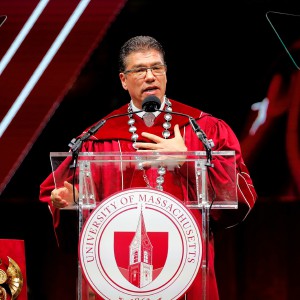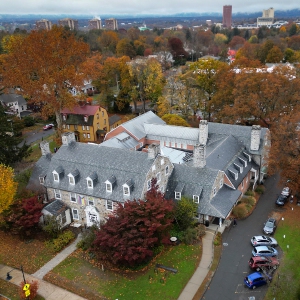‘A transformative presence’: John Bracey, a pioneer in Black studies at UMass, dies at 81
| Published: 02-08-2023 7:19 PM |
AMHERST — John Bracey, a pioneer in Black studies and founding member of the W.E.B. Du Bois Department of Afro-American Studies at the University of Massachusetts, died over the weekend at 81, according to the university.
Chancellor Kumble R. Subbaswamy announced in a campuswide email Monday the passing of Bracey, who came to UMass Amherst in 1972 and continued to teach in the department where he helped create one of the nation’s first doctoral programs in African American studies.
“He was a true champion for Black Studies and Black students, and his tireless work made us a much better university,” Subbaswamy wrote.
Subbaswamy thanked Bracey for his historic contributions and cited both his reputation, and the excellence of UMass, as serving to attract well-known author James Baldwin, who taught on campus for several years, and Betty Shabazz, activist and widow of Malcolm X, who earned a doctorate in education. UMass is also home to the archives of both Horace Mann Bond and W.E.B. Du Bois.
Barbara Krauthamer, dean of the College of Humanities & Fine Arts, called Bracey a luminary, and extended condolences to his family.
“John’s lifetime of activism in Black studies, thoughtful leadership, and meaningful student mentorship created a lasting impact that extends far beyond our college and the university,” Krauthamer said.
Bracey was born in Chicago and raised in Washington, attending Howard University and Roosevelt University in Chicago, where he earned his bachelor’s degree in 1964. Throughout the 1960s, Bracey was active in the civil rights, Black liberation and peace movements as part of the Congress of Racial Equality, Chicago Friends of the Student Nonviolent Coordinating Committee, Students for a Democratic Society, and the Revolutionary Action Movement.
While serving as a faculty member, Bracey was also a fixture in the region at events, delivering the keynote speech at the Martin Luther King Jr. breakfasts in Amherst on multiple occasions. In 2000, Bracey spoke about “The cost of racism to white America,” observing, “you’re going to have to end racism to have a society worth living in.”
Article continues after...
Yesterday's Most Read Articles
 Design Review Board in Amherst backs 5-story apartment project connected to old Hastings building
Design Review Board in Amherst backs 5-story apartment project connected to old Hastings building
 ‘Home away from home’: North Amherst Library officially dedicated, as anonymous donor of $1.7M revealed
‘Home away from home’: North Amherst Library officially dedicated, as anonymous donor of $1.7M revealed
 Connecticut man gets 8 years in Hadley shooting
Connecticut man gets 8 years in Hadley shooting
 Granby Bow and Gun Club says stray bullets that hit homes in Belchertown did not come from its range
Granby Bow and Gun Club says stray bullets that hit homes in Belchertown did not come from its range
 Charlene Galenski: Blake Gilmore, a strong candidate for Deerfield’s Selectboard
Charlene Galenski: Blake Gilmore, a strong candidate for Deerfield’s Selectboard
 Annette Pfannebecker: Vote yes for Shores Ness and for Deerfield
Annette Pfannebecker: Vote yes for Shores Ness and for Deerfield
Seven years later, he spoke at the breakfast about “the beloved community,” a concept King brought up in the 1960s. “The beloved community is a community of people who love each other because they are human beings,” Bracey said.
In 2018, Bracey was the main speaker at the annual King celebration in Northampton, offering his opinion on Donald Trump’s presidency. “We got through slavery, we can get rid of this fool,” he said.
Amilcar Shabazz, a professor of history and Africana Studies in the W.E.B. Du Bois Department of Afro-American Studies, said Bracey was the truth-telling historian who fought injustice.
“When he saw injustice in the past or present he’d say that’s stupid and just not right,” Shabazz said. “He’d then put the force of his intellect, his last dollar or whatever he could to combat the injustice and wake people up to do better.”
In Amherst, for instance, Bracey joined Ray Elliott, who founded Race Amity Day, in eliminating the disriminatory mistreatment of students through racial tracking at Amherst Regional High School.
“As is said in our cultural way, he didn’t just talk about it, he be ’bout it ’bout it,’” Shabazz said. “He was an inspiration and a transformative presence in this town for half a century.”
Local resident Gregory-Dean Smith, who goes by the name Brother North Star, posted a tribute to Bracey on his Facebook page. “The loss of Professor Bracey’s presence in our community is akin to that of a massive hole a meteorite leaves upon impact.”
At UMass, Bracey served in several roles, including as chairman of the department and co-director of the graduate certificate in African Diaspora Studies.
Bracey had been involved in an initiative known as the UMass Black Presence, a website serving as a living history of the experiences, contributions and stories of Black students, alumni, faculty and staff. That project included oral history interviews and research on historical figures.
Yolanda Covington-Ward, who chairs the W.E.B. Du Bois Department of Afro-American Studies, said Bracey was a giant in his field and one of the strongest pillars of the department. His death has left people grieving and trying to come to terms with the loss.
“Indeed, he was an institution within himself,” Covington-Ward said. “His commitment to supporting and guiding our students was invaluable; he impacted the lives of so many students and faculty.”
In 2021, UMass Amherst established the John H. Bracey Jr. Fellowship Fund to provide summer fellowship support for doctoral students in the Afro-American studies department who have achieved candidacy and are engaged in research and writing their dissertations.
Bracey’s writing and research focused on African social and cultural history, radical ideologies and movements, and the history of African American women, while his recent interests focused on the interactions between African Americans and Native Americans, Afro-Latino and Jewish Americans.
His publications include several co-edited volumes, including “Black Nationalism in America,” “African American Women and the Vote: 1837-1965,” “Strangers and Neighbors: Relations between Blacks and Jews in the United States,” co-written with Maurianne Adams, and “African American Mosaic: A Documentary History from the Slave Trade to the Twenty-First Century,” co-authored with Manisha Sinha.

 Sharing a few notes: High schoolers coaching younger string players one on one
Sharing a few notes: High schoolers coaching younger string players one on one Reyes takes helm of UMass flagship amid pro-Palestinian protests
Reyes takes helm of UMass flagship amid pro-Palestinian protests Sole over-budget bid could doom Jones Library expansion project
Sole over-budget bid could doom Jones Library expansion project Amherst poised to hire police department veteran as new chief
Amherst poised to hire police department veteran as new chief 